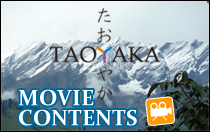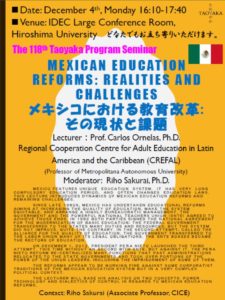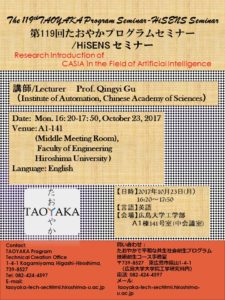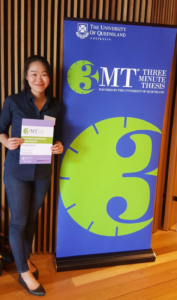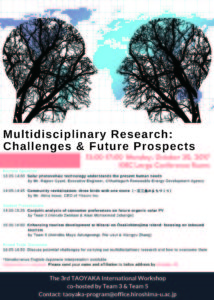News
The 4th TAOYAKA International Workshop: “Create sustainable community center in rural area”
The 4th TAOYAKA International Workshop “Create sustainable community center in rural area” will be held as below.
- Date & Time: 13:00-15:30 Thursday, December 7, 2017
- Venue: IDEC Large Conference Room, Hiroshima University
- *Simultaneous English-Japanese interpretation available
- Registration is required. Please send your name and affiliation to below address by December 6
taoyaka-progrma*office.hiroshima-u.ac.jp (Please replace * with @)
-
13:00-13:10
Opening remarks
13:10-14:00
Guest speech (50 min)
Guests from Kodani elementary school district citizens collaborative community development committee
Mr. Takeo KAGURI
Mr. Tadashi NAKANO
Mr. Yoshiaki DATE“Current situation of Kodani area & Current activities and community movements”
Break (10min)
14:10-14:50
Student presentation, Q&A (40 min) Team4
“Create sustainable community center in rural area”
15:00-15:25
Round table discussion (20 min)
“Implications for rural community development and the challenges for doing research with local residents”
15:25-15:30
Closing remarks
Two Taoyaka students received the awards at HIRAKU 3 minutes competition!
“HIRAKU 3MT Competition 2017” was successfully held on Saturday, November 25, 2017 at Higashi Hiroshima Arts& Culture Hall (Kurara). 36 doctorate students from 10 universities showcased their research in front of 260 people as public audience, with a single presentation slide in limited three minutes.
4 Taoyaka students joined the competition and 2 students received the awards. Congratulations!
Novi Syaftika(D5, Graduate school of Engineering, Technical creation course)
Title: Fueling your car with garbage and wastewater: possible?
Winner, People’s Choice – Gold (English Section), Sponsor awards (Springer Nature Award)
“I have an interest in public speaking so when I heard about this competition, it instantly attracted my attention. My motivation was mainly training myself to improve my presentation skill. Presenting about PhD research in 3 minutes was very challenging. We have to be able to deliver the message in an attractive way to the audience who come from different background, also who are non-native and native English speakers in a very short time. I revised the slide and the script several times, and the last hardest part is to memorize the script and conquer the nervous feeling. I was lucky that some friends helped me practicing and improving my performance. It was an honor to represent Taoyaka and Hiroshima University. Receiving 3 awards at once was unbelievable! However, conquering fear, gaining experience, and expanding network are the achievements that I believe obtained by all contestants. It gave me the motivation to keep learning and improving myself. It was the most unforgettable 3 minutes in my life! Thank you for all the support!”
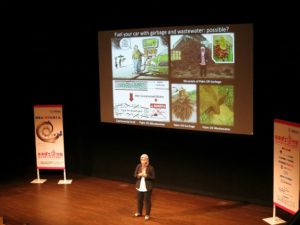

Zenitani Hiroshi(D4, Graduate school of Engineering, Technical creation course)
Title: Organic solar PV plays an active part at the disadvantaged area in the world !?
Sponsor awards (JSW Awards)
“It was not easy to condense my research into only 3 minutes speech. But preparation itself gave me an opportunity to reconsider the meaning and the importance of my own research. The contents of my speech had been made clearly by asking myself “What do I really want to convey to the audience?”
This time I dared to make my speech cover not only my research regarding photovoltaics but also the rich experience of TAOYAKA onsite team project. I really hope that the audience understood through my speech even just a little about the people and their quality of life in disadvantaged areas.”
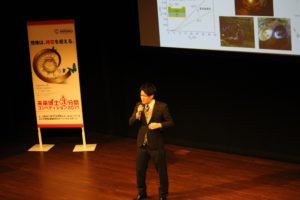
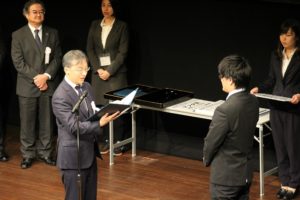
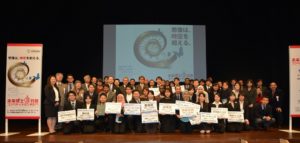
(Dec 4) The 118th TAOYAKA Program Seminar
The 118th TAOYAKA Program Seminar will be held.
Everyone is welcome. We look forward to seeing you at the seminar.
■ Date: December 4th, Monday 2017
■ Time: 16:10 – 17:40
■ Venue: Large Conference Room, 1F Graduate School for International Development and Cooperation (IDEC), Hiroshima University
■ Title: Mexican education reforms: Realities and challenges
■ Speaker: Carlos Ornelas, Ph.D. Regional Cooperation Centre for Adult Education in Latin America and the Caribbean (CREFAL)
■ Moderator: Riho Sakurai, Ph.D. (Associate Professor, CICE)
■ Language: English
Abstract:
Mexico features unique education system. It has very long compulsory education period, and often changes education laws. This lecture introduces dynamics of Mexican education reforms and remaining challenges.
Since late 1980s, Mexico has undertaken educational reforms aiming at increasing the quality of education, make the system equitable, and arrange a highly bureaucratic management. The government and the powerful National Teachers Union (SNTE) agreed to achieve those ends. In 1992 both parties signed the National Agreement for the Modernization of Basic Education; the federal government transferred to the states many duties and resources, but the system did not improve, quite the contrary. In the second attempt, called the Alliance for the Quality of Education, the government transferred to the Labor Union many of its legal obligations. The SNTE bosses became the rectors of education.
On December 1, 2012, President Peña Nieto launched the third attempt. This time without an accord with SNTE, but against it. The Peña Nieto Reform re-centralized many functions that past administrations relocated to the state governments and took over portions of the power of the Union leaders, including the imprisonment of some of them.
The reforms appear to be working fine against some corporatist traditions of the Mexican education system but in a very complex political context. The lecturer will base his analysis on two concepts: power technology and dialectics of control in regards to Mexican education reforms.
The 119th TAOYAKA Program Seminar
The 119th TAOYAKA program seminar will held as follows.
■ Time & Date : 16:20-17:50, Monday, October 23, 2017
■ Venue : A1-141, Middle Meeting Room of Engineering, Hiroshima University
■ Theme : Research Introduction of CASIA in the Field of Artificial Intelligence
■ Lecturer : Prof. Qingyi Gu, Institute of Automation, Chinese Academy of Sciences
■ Language: English
■ Object Persons : Students and Teachers
■ Contact: Taoyaka Program Technical Creation Office
E-mail: taoyaka-tech-sect{at}ml.hiroshima-u.ac.jp
Please replace{at}with @.
TEL: 082-424-4597
TAOYAKA Student Seminar Series (TSSS) will be back on November 16
We are pleased to announce that the TSSS will resume on Thursday, November 16, continued from spring semester. TAOYAKA Student Ambassadors (TSAs) are continued to be in charge of managing the series.
One of the unique features of TAOYAKA program is the students’ diversity in academic and career backgrounds. TAOYAKA Students belong to three academic disciplines – Cultural Creation, Technical Creation, and Social Implementation courses- from seven different graduate schools. In their third year, students from three different courses, will be teamed-up to conduct multidisciplinary research/project to deal with actual problems/issues in a society.
The series provides students with opportunities for exchanging ideas and skills between different disciplines as well as explaining their studies to multidisciplinary audience. For M2 students, specifically, this is very important opportunity to consider their team members for implementing multidisciplinary research/project.
The series usually consists of two seminars by students in two of three courses of the TAOYAKA program. This semester, it will be held on selected Thursdays from 12:50 t0 14:20 at the TAOYAKA classroom/Free Space at Daigaku-Kaikan. Details are as follows. Everyone is welcome! Please come and join our seminar series!!
<TAOYAKA Student Seminar Series Schedule 2017 >
(Fall/Winter)
Time:12:50-14:20
Place: TAOYAKA classroom/Free Space at Daigaku-Kaikan (2F)
■Series IV: Thursday, November 16, 2017
* This is specially organized by two students who learned effective interview skills to share their learned materials using a hands-one workshop style. We will invite the instructor who provided the workshop for these students and hold a one-day workshop. This student series is also held as a pre-seminar for the actual/full-workshop.
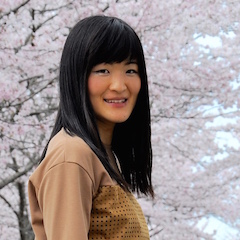 ◎Seminar #7 & 8 : <Are you asking GOOD questions? The interview skill you need to know for successful bottom-up research & projects>
◎Seminar #7 & 8 : <Are you asking GOOD questions? The interview skill you need to know for successful bottom-up research & projects>
Rie Usui, D2, Cultural Creation Course, Graduate School of Integrated Arts and Sciences,division of Integrated Arts and Sciences
AND
 Qu Meng, M2, Cultural Creation Course, Graduate School of Integrated Arts and Sciences,division of Integrated Arts and Sciences
Qu Meng, M2, Cultural Creation Course, Graduate School of Integrated Arts and Sciences,division of Integrated Arts and Sciences
■Series V: Thursday, December 14, 2017
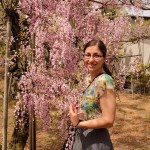 ◎Seminar #9: <Nurturing sustainable agro-food systems in Japan: the role of new entrant organic farmers>
◎Seminar #9: <Nurturing sustainable agro-food systems in Japan: the role of new entrant organic farmers>
Simona Zollet, M2, Cultural Creation Course, Graduate School for International Development and Cooperation, Program in Educational Development and Cultural and Regional Studies
 ◎Seminar #10: <Development of sensor based AI system for walking robots>
◎Seminar #10: <Development of sensor based AI system for walking robots>
Sunandan Dutta, D1, Technical Creation Course, Graduate School of Engineering, Program in System Cybernetics
■Series VI: Thursday, January 25, 2018
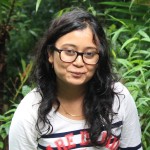 ◎Seminar #11: <ForceHand – An interactive glove enabled with pneumatic artificial muscles>
◎Seminar #11: <ForceHand – An interactive glove enabled with pneumatic artificial muscles>
Swagata Das, M2, Technical Creation Course,Graduate School of Engineering, Program in System Cybernetics
 ◎Seminar #12: <TBA>
◎Seminar #12: <TBA>
Nguyen Phu Toan, D2, Social Implementation Course, Graduate School for International Development and Cooperation, Program in Development Science
(Dec 7) The 120th TAOYAKA Program Seminar
The 120th TAOYAKA Program Seminar will be held.
Everyone is welcome. We look forward to seeing you at the seminar.
■ Date: December 7th, Thursday 2017
■ Time: 16:20 – 17:50
■ Venue: Large Conference Room, 1F Graduate School for International Development and Cooperation (IDEC), Hiroshima University
■ Title: Immigrants’ Residential and Occupational Mobility in the U.S. and Local Policies
■ Speaker: Dr. Cathy Yang Liu, Associate Professor of Public Policy, Andrew Young School of Policy Studies, Georgia State University; Managing Editor, Journal of Urban Affairs
■ Moderator: Junyi ZHANG (Professor, IDEC)
■ Language: English
Abstract:
The immigrant population is an important force shaping American cities in numerous ways. In designing viable policy and planning responses to incorporate immigrants at the local level, we need to understand their residential mobility patterns in the housing market and occupational mobility patterns in the labor market, both of which are pathways to economic mobility. This presentation synthesizes my two recent research projects which examine 1) immigrants changing residential location choices over time both within and across metropolitan areas and 2) the evaluation of the top employment niches that immigrants concentrate in from 1990 to 2010 using U.S. Census data. In addition, I will discuss a new local policy trend called “welcoming city” as a recent policy innovation to engage the immigrant population in urban development.
April 2018 Admission/October 2018 Admission
(General Selection/Transfer Admission into 3rd year)
Application Period
November 6 to November 17, 2017 at 5:00 p.m. (JST)
Application Guideline
Prescribed Form
General Selection (Word)
Transfer Admission into 3rd year (Word)
Online Application
Online Application system
*Only available during the application period
Please be familiar with the information from the links below before applying.
FAQ / Financial Support
Contact
Taoyaka Program Office, Hiroshima University
E-mail: apply[a]taoyaka.hiroshima-u.ac.jp *Please replace [a] with @.
Tunchai Mattana, one of the first graduates of TAOYAKA program won the award of “Cosmos Editor’s Choice” at the Asia-Pacific 3MT Semi-Final 2017
Tunchai Mattana, the winner of the Global Challenge Award at the Three Minutes Competition for Future Doctors 2016, made three-minute presentation on her research at the Asia-Pacific 3MT Semi-Final held on September 29, 2017, as a representative of Hiroshima University. She competed with 54 representatives from universities across the APAC region and won the award of “Cosmos Editor’s Choice”! Her presentation video will be shortly publicized in the website of the Cosmos, the science magazine.
She said, “I got really nervous as it was such a huge competition in a huge auditorium, but it was a learning opportunity. I’ve got new network built among young researchers, which will be my asset.”
The 3rd TAOYAKA International Workshop: “Multidisciplinary Research: Challenges & Future Prospects”
The 3rd TAOYAKA International Workshop “Multidisciplinary Research: Challenges & Future Prospects” will be held as below.
- Date & Time: 13:00-17:00 Monday, October 30, 2017
- Venue: IDEC Large Conference Room, Hiroshima University
- *Simultaneous English-Japanese interpretation available
- Registration is required. Please send your name and affiliation to below address by October 25
taoyaka-progrma*office.hiroshima-u.ac.jp (Please replace *to @)
-
13:00-13:15
Introduction
13:20-14:00
Guest speaker 1 (40 min)
Mr. Rajeev Gyani, Chief Engineer, CREDA (Chhattisgarh Renewable Energy Development Agency)
“Solar photovoltaic technology understands the present human needs ”
14:05-14:45
Guest speaker 2 (40 min), Mr. Akira Inoue from Mitarai
Mr. Akira Inoue, Manager, Yōsoro LCC (合同会社よ~そろ)
“Community Revitalization; Three birds with one stone (一石三鳥のまちづくり)”
Break (10min)
14:55-15:25
Student presentation (30 min) Team3
“Conjoint Analysis of Consumers’ Preferences on Future Organic Solar PV”
15:30-16:00
Student presentation (30 min) Team5
“Enhancing Tourism Development at Mitarai on Osakishimojima Island: Focusing on Inbound Tourism”
16:05-16:50
Poster session & Round table discussion (45 min)
“Q & A, Sharing information and experiences”
16:55-17:00
Closing remarks
(Dec 4) The 118th TAOYAKA Program Seminar
The 118th TAOYAKA Program Seminar will be held.
Everyone is welcome. We look forward to seeing you at the seminar.
■ Date: December 4th, Monday 2017
■ Time: 16:10 – 17:40
■ Venue: Large Conference Room, 1F Graduate School for International Development and Cooperation (IDEC), Hiroshima University
■ Title: Mexican education reforms: Realities and challenges
■ Speaker: Carlos Ornelas, Ph.D. Regional Cooperation Centre for Adult Education in Latin America and the Caribbean (CREFAL)
■ Moderator: Riho Sakurai, Ph.D. (Associate Professor, CICE)
■ Language: English
Abstract:
Mexico features unique education system. It has very long compulsory education period, and often changes education laws. This lecture introduces dynamics of Mexican education reforms and remaining challenges.
Since late 1980s, Mexico has undertaken educational reforms aiming at increasing the quality of education, make the system equitable, and arrange a highly bureaucratic management. The government and the powerful National Teachers Union (SNTE) agreed to achieve those ends. In 1992 both parties signed the National Agreement for the Modernization of Basic Education; the federal government transferred to the states many duties and resources, but the system did not improve, quite the contrary. In the second attempt, called the Alliance for the Quality of Education, the government transferred to the Labor Union many of its legal obligations. The SNTE bosses became the rectors of education.
On December 1, 2012, President Peña Nieto launched the third attempt. This time without an accord with SNTE, but against it. The Peña Nieto Reform re-centralized many functions that past administrations relocated to the state governments and took over portions of the power of the Union leaders, including the imprisonment of some of them.
The reforms appear to be working fine against some corporatist traditions of the Mexican education system but in a very complex political context. The lecturer will base his analysis on two concepts: power technology and dialectics of control in regards to Mexican education reforms.



